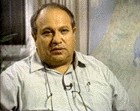Why is Israel's Mossad Chief Sounding Fresh Alarm?
Meir Dagan, chief of Israel’s Mossad intelligence service, delivered an explosive message in his annual report to the Knesset’s Foreign Affairs and Defense Committee Monday, January 24.
“By the end of 2005, the Iranians will have reached the point of no-return from the technological perspective of creating a uranium enrichment capability,” he said.
Predicting that Iran would be able to make its first nuclear bomb in around two years, Dagan said: “The moment that you have the technology for enrichment, you are home free.”
The intelligence chief’s comments came on the heels of a warning from US vice president Dick Cheney last week, in which he raised the possibility of Israel opting to attack Iran’s nuclear facilities at the risk of a strong Iranian military retaliation.
The secret talks in the past two weeks between the Iranians and the E3 – Germany, France and Britain – appear to have reached an impasse. Nothing else appears to have happened concerning Iran’s nuclear program to justify Cheney’s tough talk to USA Today.
But DEBKA-Net-Weekly’s Iranian experts can report exclusively the vice president decided to speak out in response to experiments the Iranians began conducting early this month at their uranium enrichment facilities in Nantaz. The tests involved the operation of clusters of gas centrifuges, each containing 164 systems. Even the partial operation of such large clusters, experts believe, can rapidly produce fissionable material for military use. Based on US and Israeli intelligence assessments, our sources report that Iran will be able to produce unlimited quantities of enriched uranium for a nuclear bomb if its engineers apply the right technology for operating the centrifuges.
The experiments and activation of the centrifuges are in themselves violations of Iran’s promise to the International Atomic Energy Agency and the Europeans to suspend uranium enrichment. But that doesn’t matter much to Tehran. Iranian leaders are out to drag out the negotiations with the Europeans until the centrifuge cluster technology is operational and then quit the talks.
Since Cheney knows, as Dagan made clear in his briefing in parliament, that Israel cannot afford to wait until Iran acquires the capability to produce weapons-grade uranium, the vice president raised the possibility of an Israeli military strike against Iran’s nuclear facilities without waiting for Washington’s okay. This is what happened in June 1981 when Israeli warplanes bombed Iraq’s Osirak atomic reactor.
One of the reasons Israeli prime minister Ariel Sharon chose Dagan for the top Mossad post was his ability to initiate and plan covert overseas operations, especially in the Muslim world. Among intelligence and military experts in the West and in Israel, there is little doubt that if anyone is capable of mounting a clandestine or overt strike for wiping out Iran’s nuclear program, ex-general Dagan is the man.


